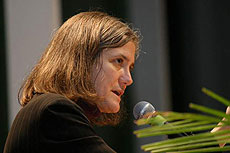February 28, 2005
Independent media essential to democracy,
says Amy Goodman
By Jennifer McNulty
In a scathing indictment of U.S. media, Democracy Now!
host Amy Goodman discussed the importance of independent, corporate-free
media and the role it plays in democracy before a spellbound
capacity crowd last week.

Amy Goodman was honored by College Ten for her “outstanding
commitment to preserving the integrity of journalism.”
Photo: Matt Fitt |
“The media is absolutely essential to the functioning
of a democracy,” said Goodman. “It’s not our
job to cozy up to power. We’re supposed to be the check
and balance on government.”
Calling on U.S. media outlets to provide honest coverage of
the war in Iraq, including footage of Iraqi civilian casualties,
Goodman said she is confident that Americans would oppose the
war if they saw the images that are being broadcast and published
by overseas media companies.
“I don’t like the whole reality-TV craze, but I think
we need some reality TV when it comes to war,” said Goodman,
coauthor of the best-selling book, The Exception to the Rulers:
Exposing Oily Politicians, War Profiteers, and the Media Who
Love Them.
President Bush’s executive order forbidding the publication
of photographs of flag-draped coffins of U.S. military casualties
is a reminder that administration officials “know the power
of the image,” said Goodman. “But it is not the job
of the media to sanitize war.”
Goodman’s lecture was presented by the UCSC Alumni Association
and College Ten as part of the UCSC Distinguished Visiting Professor
Series.
Several hundred people filled the Colleges Nine and Ten Multipurpose
Room for the event, during which Goodman was presented with
College Ten’s first Ruben Salazar Journalism Award for
her “outstanding commitment to preserving the integrity
of journalism.”
Salazar, a pioneering Latino journalist, was killed by a sheriff’s
tear-gas projectile during an anti-Vietnam War protest in East
Los Angeles in 1970. An in-progress documentary about Salazar
by UCSC undergraduates Leilani Montes and Victoria Fong, which
was screened as part of the event, received high praise from
Goodman, who told the filmmakers, “What a future you have
ahead of you.”
Goodman began her career in community radio in 1985 and helped
launch Democracy Now! in 1996. The program has helped
make Pacifica Radio the largest community media collaboration
in the country and built its global audience.
Independent media is important because it presents diverse
points of view and gives voice to the powerless, said Goodman.
By contrast, she said, corporate-backed media in this country
“silenced the majority” during the lead-up to the
U.S. invasion of Iraq.
“Most people opposed this invasion, and not just those
in the peace movement,” said Goodman, referring to opposition
at the “highest levels” of the country. “But
you wouldn’t know it from watching television.”
Goodman singled out the New York Times, which she said
sets the agenda for corporate-owned media nationwide, for failing
to report critically on the claims of the Bush administration
before the war. The paper’s impact is evident in the majority
of Americans who still believe Iraq had weapons of mass destruction.
“Americans aren’t stupid, but if they watch television
or read the papers, this is what they were told,” she said.
The media’s failure to present diverse voices contributes
to the vilification of entire populations, which Goodman said
was evident in the abuses that took place in Iraq’s Abu
Ghraib Prison. “Young people growing up in this country
don’t hear different voices, which makes it so much easier
to vilify them,” she said. “Whole populations are
demonized, which is why it’s absolutely critical that we
hear them talking.”
Even as she called for better coverage, Goodman detailed the
unprecedented dangers facing journalists. On April 8, 2003,
U.S. military forces in Baghdad killed three journalists and
injured several others during three separate attacks that appeared
to target reporters, said Goodman. Military officials claimed
the attacks were in response to enemy fire, and CNN commentator
Wesley Clark said the journalists had been “in the wrong
place at the wrong time.” But overseas media responded
very differently, with hundreds of journalists in Spain memorializing
their fallen colleague by turning their backs on the prime minister
in Parliament and “refusing to take down the words of the
powerful.” Later, gathering outside the U.S. Embassy, they
laid down their pens, cameras, and video cameras, entered the
intersection to stop traffic, and pointed to the embassy building,
yelling, “Murderer!”
Calling the media the “most powerful institution on Earth,”
Goodman said, “We have to protect all journalists, and
journalists have to be allowed to do their jobs.”
Goodman knows from personal experience the dangers facing journalists
who choose to cover wars and high-stakes conflicts. In 1991,
while in the Indonesian province of Timor to report on an investigation
of human rights abuses by the Indonesian military, she was eyewitness
to the massacre of 270 people by soldiers using arms supplied
by the United States. Barely escaping, Goodman continued to
follow events in the region, and she covered the independence
of East Timor in 2002.
“This nation of survivors had prevailed,” she said,
recalling the celebration on May 20, 2002. “They had resisted
and won, but at an unbelievably high price.”
Because the United States is a major weapons producer, Americans
have a daily responsibility to shape their country’s foreign
policy, said Goodman.
“We are the most powerful country on Earth, and I believe
we represent two things: the sword and the shield,” she
said. “The shield is the American people. People around
the world rely on us to turn those guns away from them. Every
hour of every day, whether a journalist or a student, a professor
or a librarian… employed or unemployed, we have a decision
to make every hour of every day, and that’s whether to
represent the sword or the shield.”
Return to Front Page